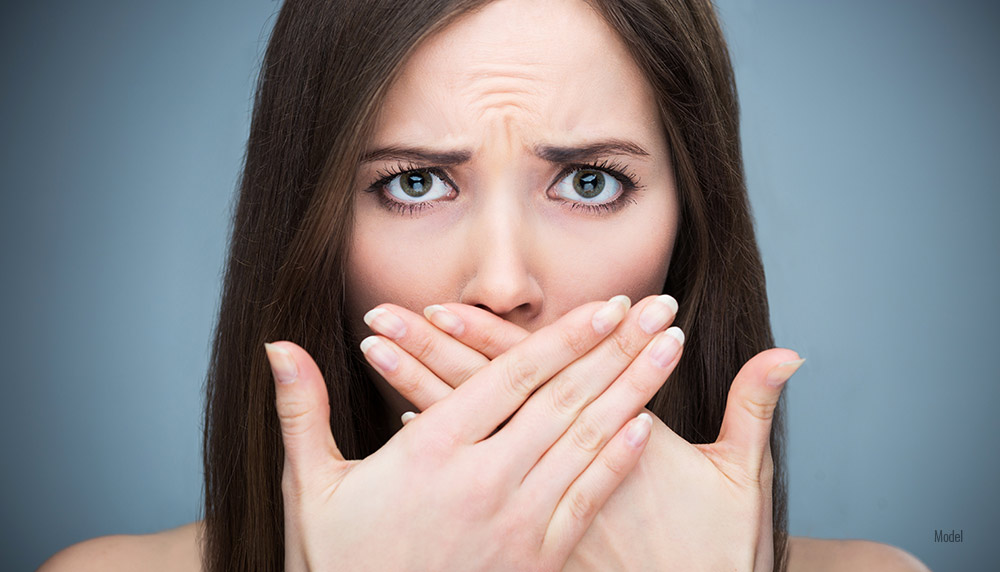5 Facts About Bad Breath (Halitosis)

Halitosis, commonly known as bad breath, can be an embarrassing and persistent problem for many individuals. While occasional bad breath is normal, chronic halitosis can indicate underlying oral health issues or lifestyle factors that need to be addressed. In this blog, we’ll provide five facts about bad breath, including the two primary causes.
4 Min Read:
Halitosis Defined
Most everyone has been embarrassed by their “morning breath” from time to time, but what about when bad breath happens all the time? Halitosis refers to a persistent, unpleasant breath odor that is noticeable to others. It can originate from various sources within the mouth, including the tongue, gums, teeth, and throat. While certain foods, beverages, and medical conditions may lead to temporary bad breath, they are not the main cause of chronic halitosis.
1. Most Cases of Halitosis Are Not Systemic
Bad breath may be a symptom of underlying medical conditions such as sinus and respiratory infections, acid reflux, liver or kidney disease, and certain cancers. These conditions can produce distinct odors often perceived as halitosis, but once they are properly addressed, the associated bad breath should stop. However, diabetes can weaken the gums and exacerbate periodontal disease.
2. Foods & Beverages Are Not The Primary Cause of Halitosis
Certain foods and beverages, such as onions, garlic, coffee, and alcohol, contain compounds that contribute to bad breath. Debris from these substances can linger in the mouth and be released during exhalation, resulting in foul odor, but this kind of bad breath can be easily corrected by brushing and flossing.
3. Dry Mouth Contributes to Halitosis
Saliva plays a crucial role in washing away food particles and bacteria in the mouth. Reduced saliva production, often caused by medications, medical conditions, or mouth breathing, can lead to dry mouth, gum disease, and bad breath.
4. Oral Bacteria Produce Sulfur Compounds and Cause Halitosis
Poor oral hygiene, including inadequate brushing and flossing, causes sugar and food particles to accumulate on the teeth and in the soft tissues of the mouth, allowing bacteria to feed and spread. It only takes 24 hours for plaque to turn into tartar, which is loaded with this potent sulfur-producing oral bacteria, the leading cause of halitosis and gum disease.
5. Gum Disease Leads to Stubborn Halitosis
Periodontal disease, characterized by inflammation and infection of the gums, can cause halitosis due to the abundance of bacteria in tartar buildup along the gumline. While systemic illness is not a frequent cause of halitosis, its primary cause, gum disease, can lead to systemic disease.
Preventing and Correcting of All Forms of Bad Breath
The following tips can help you avoid temporary bad breath and chronic halitosis while significantly lowering the chance of developing gum disease:
- Maintain good oral hygiene: Brush your teeth twice daily with fluoride toothpaste, floss daily to remove plaque and food particles between teeth, and use a tongue scraper to clean the tongue’s surface and reduce bacterial buildup.
- Attend regular dental checkups: Schedule routine dental visits for professional cleanings and checkups to detect and address any oral health issues, such as gum disease or tooth decay, that may contribute to bad breath.
- Stay hydrated: Drink plenty of water throughout the day to keep the mouth moist and promote saliva production. Chewing sugar-free gum or sucking on sugar-free candies can also stimulate saliva flow and alleviate dry mouth.
- Watch your diet: Limit consumption of foods and beverages known to cause bad breath, such as onions, garlic, coffee, and alcohol. Instead, opt for fresh fruits and vegetables, sugar-free gum, and water to maintain oral freshness.
- Quit smoking: Smoking and tobacco use can dry out the mouth, promote bacterial growth, and contribute to gum disease, all of which can lead to halitosis. Quitting smoking can significantly improve oral health.
- Address medical conditions: If bad breath persists despite proper oral hygiene habits, consult a healthcare professional to rule out underlying medical conditions and receive appropriate treatment.
- Try a dentist-approved antibacterial mouthwash: Mouthwash, breath sprays, and sugar-free mints can temporarily mask bad breath and provide a quick fix. Because over-the-counter mouthwashes are typically ineffective, ask your dentist to recommend an antibacterial mouthwash rather than guessing about its effectiveness.
Bad Breath: The Bottom Line
Bad breath is a common yet treatable problem with various causes, including poor oral hygiene, gum disease, dietary factors, dry mouth, and underlying medical conditions. By practicing a proper oral hygiene routine, maintaining a healthy diet, drinking plenty of water, and addressing underlying health issues, individuals can correct bad breath while improving their oral health and confidence in social interactions.
If halitosis persists despite these efforts, see a dental professional or healthcare provider for further evaluation and personalized treatment recommendations.
Treating Bad Breath in Chicago, IL
Dr. Vlad Fedin provides comprehensive dentistry in Chicago, including halitosis prevention and treatment, as well as periodontal care. Call 312-642-6631 today to learn more!